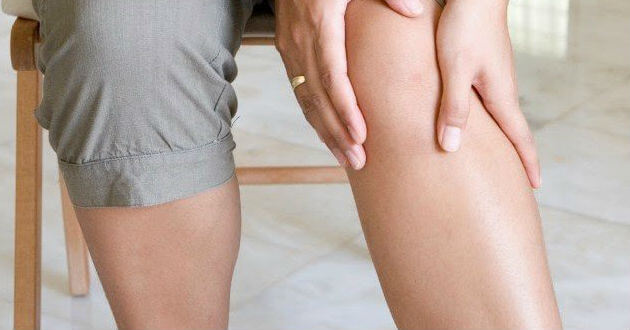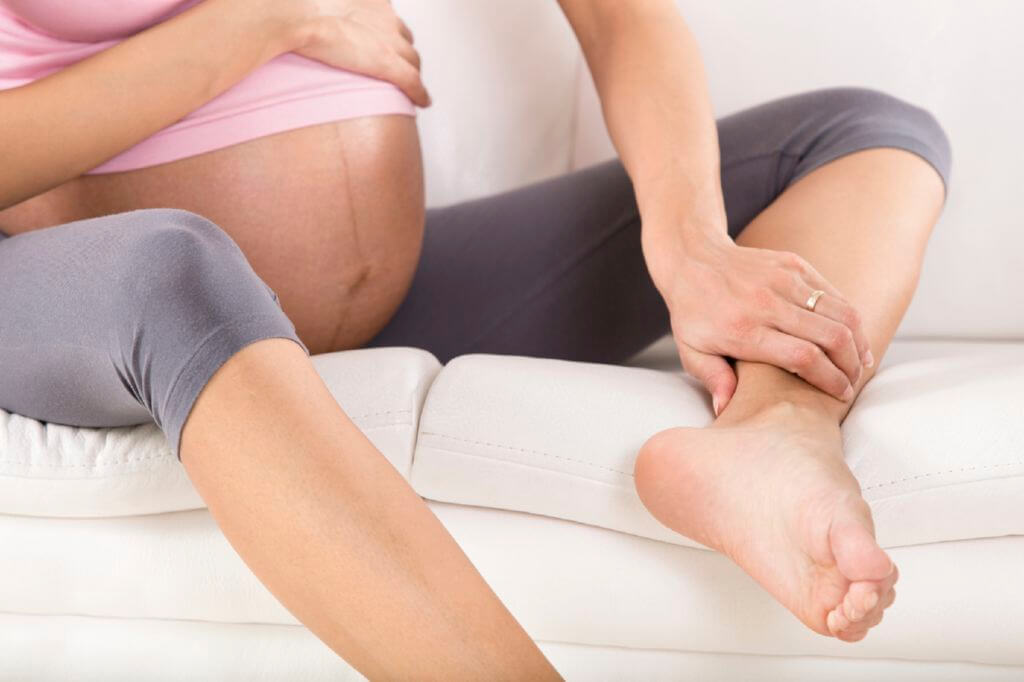How to Reduce Edema in Women's Legs during Pregnancy

Cases of edema in women’s legs during pregnancy are common. Despite the fact that the third trimester is when they most often occur, there are some women whose legs, hands and ankles swell up even during the first weeks of gestation.
It’s a well-known fact that the swelling of women’s legs during pregnancy is due to the retention of liquids in the body and a lack of proper irrigation of blood towards the extremities, caused by the pressure of the uterus on the veins.
However, although the process of pregnancy itself keeps us from being able to eliminate this problem, there are still ways to at least reduce the swelling.
How to reduce edema in women’s legs
Avoid staying in the same position for long periods of time
In order to reduce edema in your legs, avoid staying in the same position for long periods of time.
Inflammation in your lower extremities prevails and even worsens when you remain in the same position for too long, whether you’re sitting or standing.
In order to prevent this from happening, we advise you to stand up and sit down alternately, walk around, do some errands, lay down a while… in other words, maintain a balance between resting and standing, alternating between different positions and activities.
Walk
Walking is an excellent exercise for pregnant women.
As long as your OB-GYN allows it, go for short walks. This physical activity will contribute to better blood flow.
Give yourself a massage

Massages, especially leg massages, stimulate the lymphatic glands and improve circulation of the lymph.
This therapeutic process also helps to reduce hematomas and bring down the inflammation of varicose veins.
Elevate your legs
When you’re sitting or lying down, elevate your legs at a position higher than your pelvis. This improves blood flow and reduces the pressure on your legs.
Regulate your salt intake
Salt is an important part of the human organism because it provides iodine.
Iodine deficiency during pregnancy can cause a goiter, weight gain, miscarriage, depression, as well as mental retardation and deformities in the fetus.
Feeling fat lasts nine months, but the joy of becoming a mom lasts forever.
–Nikki Dalton–
Salt contributes to good hydration because it increases the desire to drink water and it helps to regulate the fluids in the body; it also partakes in the generation of impulse nerves and the relaxation of muscles.
But, just like its deficit, an excess of salt can be damaging – especially during pregnancy.
During pregnancy, an excess of sodium iodine can bring about an increase in blood pressure. It also favors weight gain, increases kidney problems, and increases fluid retention – causing edema.
If you want to have a pleasant pregnancy, be sure to maintain a healthy balance of salt in your diet.
Keep your legs in constant movement
The movement of your legs help to lighten the heaviness you feel in them, as well as the numbing and the swelling.
Use low-heeled shoes
During gestation, you should avoid heels and tall shoes. These are always more risky than any other footwear you can choose.
Low-heeled shoes or flats that aren’t tight fitting are more beneficial while you’re walking, and they improve blow flow to your lower extremities.
Drink plenty of water

Edema is the product of fluid retention in the body, but that definitely doesn’t mean you should drink less water. In fact, just the opposite is true!
If you suffer swelling in your legs, the best thing to do is keep yourself hydrated.
Water helps you purify your body and eliminate toxins in the lymph. This will directly reduce your edema.
Eat enough fruits and drink teas made of diuretic plants
In order to reduce fluid retention, you should add more fruit to your diet and drink teas made of diuretic plants.
Some of the fruits you can’t leave out of your diet are pineapple, lemon, orange, papaya and melon; and if you’re going to drink teas, choose those made of dandelion, verbena, plantain or nettle.
You can also eat vegetables that have these same properties. We suggest making salads that include celery, asparagus, and ripe tomatoes.
How to reduce edema in the legs during pregnancy
Lastly, we want to give you these final tips:
- Pour cold water over your legs, and then do the same with hot water. Switch back and forth between hot and cold water to increase blood circulation.
- Use loose fitting clothes, especially on your legs.
- Apply relaxing gels for tired legs
Cases of edema in women’s legs during pregnancy are common. Despite the fact that the third trimester is when they most often occur, there are some women whose legs, hands and ankles swell up even during the first weeks of gestation.
It’s a well-known fact that the swelling of women’s legs during pregnancy is due to the retention of liquids in the body and a lack of proper irrigation of blood towards the extremities, caused by the pressure of the uterus on the veins.
However, although the process of pregnancy itself keeps us from being able to eliminate this problem, there are still ways to at least reduce the swelling.
How to reduce edema in women’s legs
Avoid staying in the same position for long periods of time
In order to reduce edema in your legs, avoid staying in the same position for long periods of time.
Inflammation in your lower extremities prevails and even worsens when you remain in the same position for too long, whether you’re sitting or standing.
In order to prevent this from happening, we advise you to stand up and sit down alternately, walk around, do some errands, lay down a while… in other words, maintain a balance between resting and standing, alternating between different positions and activities.
Walk
Walking is an excellent exercise for pregnant women.
As long as your OB-GYN allows it, go for short walks. This physical activity will contribute to better blood flow.
Give yourself a massage

Massages, especially leg massages, stimulate the lymphatic glands and improve circulation of the lymph.
This therapeutic process also helps to reduce hematomas and bring down the inflammation of varicose veins.
Elevate your legs
When you’re sitting or lying down, elevate your legs at a position higher than your pelvis. This improves blood flow and reduces the pressure on your legs.
Regulate your salt intake
Salt is an important part of the human organism because it provides iodine.
Iodine deficiency during pregnancy can cause a goiter, weight gain, miscarriage, depression, as well as mental retardation and deformities in the fetus.
Feeling fat lasts nine months, but the joy of becoming a mom lasts forever.
–Nikki Dalton–
Salt contributes to good hydration because it increases the desire to drink water and it helps to regulate the fluids in the body; it also partakes in the generation of impulse nerves and the relaxation of muscles.
But, just like its deficit, an excess of salt can be damaging – especially during pregnancy.
During pregnancy, an excess of sodium iodine can bring about an increase in blood pressure. It also favors weight gain, increases kidney problems, and increases fluid retention – causing edema.
If you want to have a pleasant pregnancy, be sure to maintain a healthy balance of salt in your diet.
Keep your legs in constant movement
The movement of your legs help to lighten the heaviness you feel in them, as well as the numbing and the swelling.
Use low-heeled shoes
During gestation, you should avoid heels and tall shoes. These are always more risky than any other footwear you can choose.
Low-heeled shoes or flats that aren’t tight fitting are more beneficial while you’re walking, and they improve blow flow to your lower extremities.
Drink plenty of water

Edema is the product of fluid retention in the body, but that definitely doesn’t mean you should drink less water. In fact, just the opposite is true!
If you suffer swelling in your legs, the best thing to do is keep yourself hydrated.
Water helps you purify your body and eliminate toxins in the lymph. This will directly reduce your edema.
Eat enough fruits and drink teas made of diuretic plants
In order to reduce fluid retention, you should add more fruit to your diet and drink teas made of diuretic plants.
Some of the fruits you can’t leave out of your diet are pineapple, lemon, orange, papaya and melon; and if you’re going to drink teas, choose those made of dandelion, verbena, plantain or nettle.
You can also eat vegetables that have these same properties. We suggest making salads that include celery, asparagus, and ripe tomatoes.
How to reduce edema in the legs during pregnancy
Lastly, we want to give you these final tips:
- Pour cold water over your legs, and then do the same with hot water. Switch back and forth between hot and cold water to increase blood circulation.
- Use loose fitting clothes, especially on your legs.
- Apply relaxing gels for tired legs
This text is provided for informational purposes only and does not replace consultation with a professional. If in doubt, consult your specialist.








